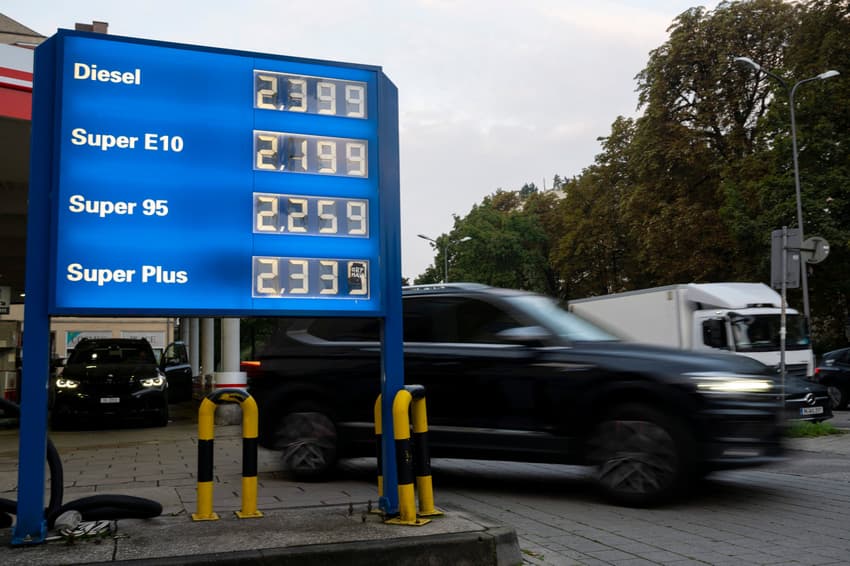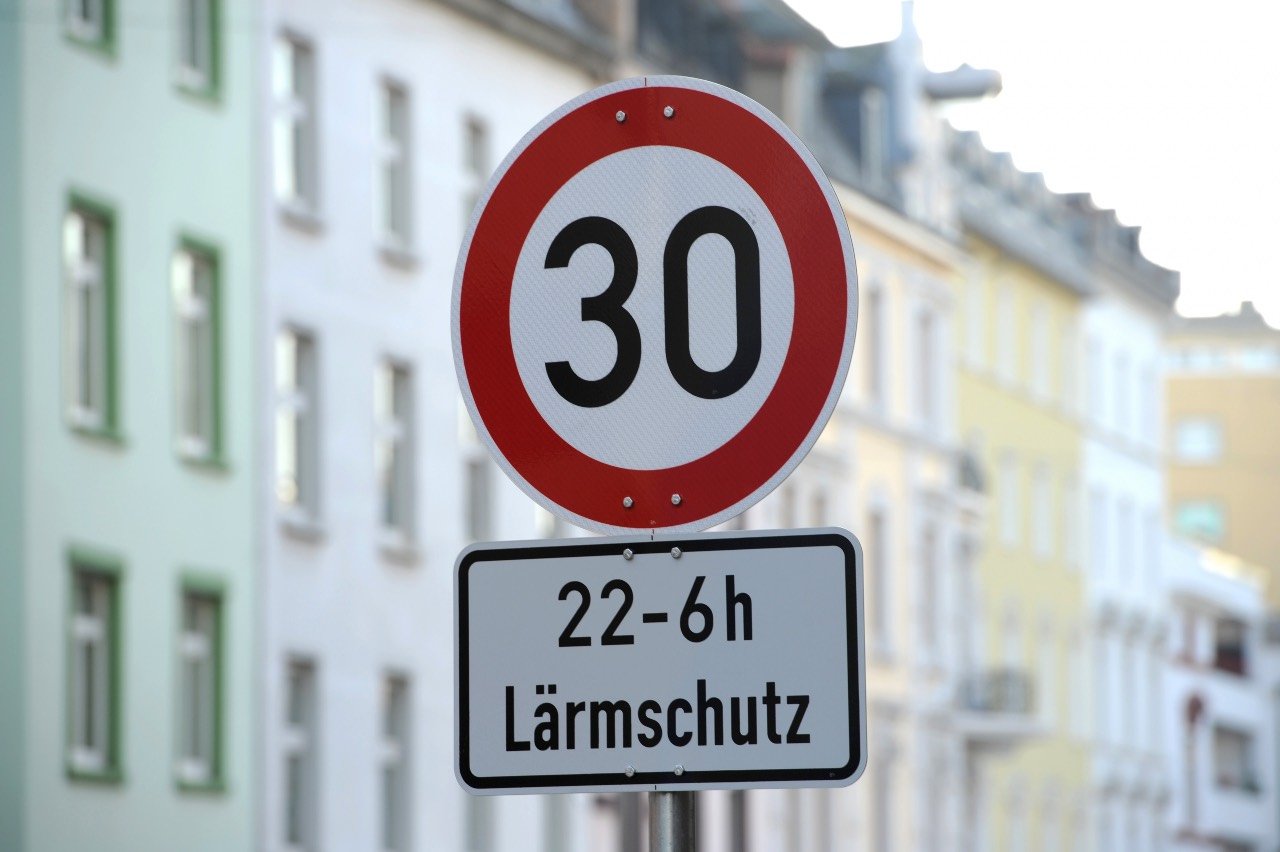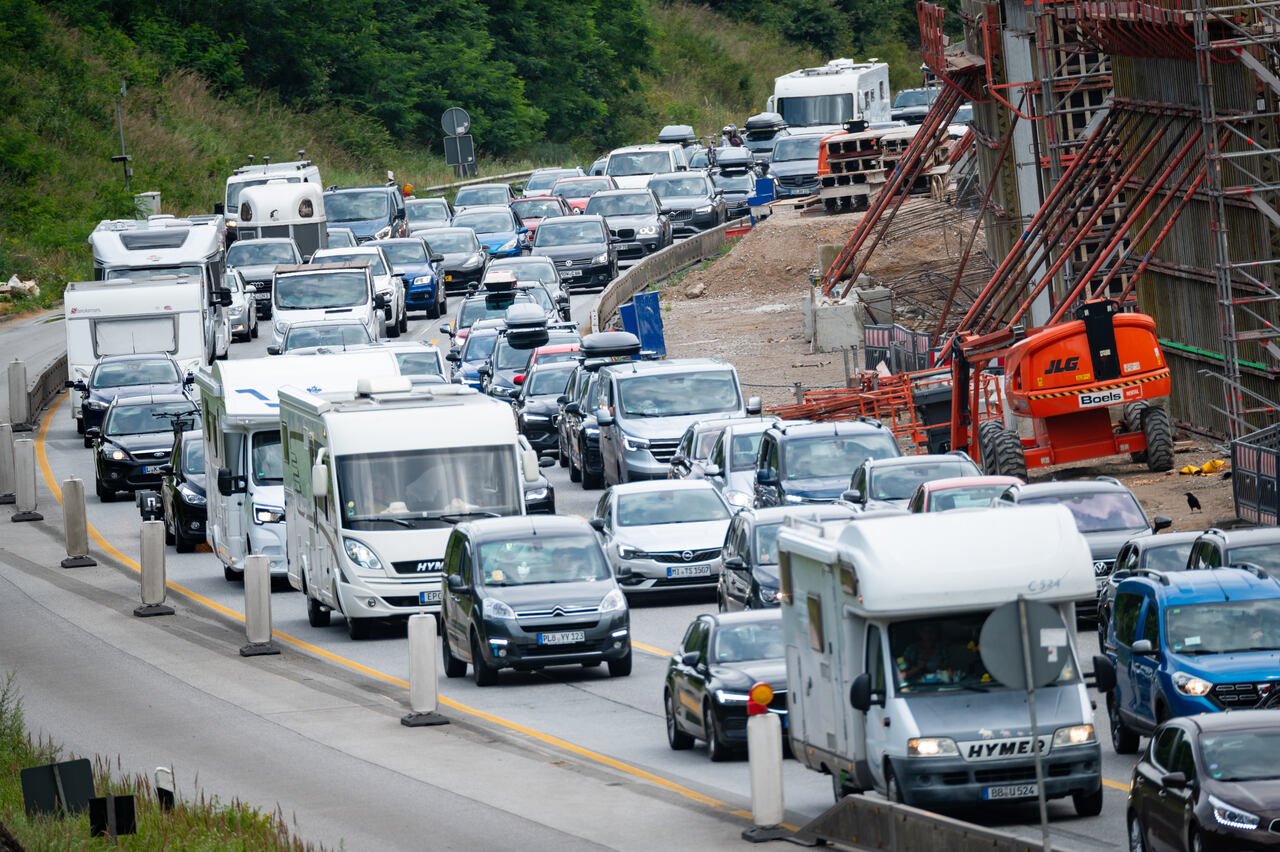EXPLAINED: Where in Germany are diesel cars banned?

In some German cities diesel cars are firmly forbidden whereas in others the cars - considered to be heavier polluters - are still allowed. Here's what drivers in Germany need to know.
Driving bans for diesel cars in Germany are put in place when the EU limit value of 40 micrograms of nitrogen dioxide per cubic metre is repeatedly exceeded in cities and conurbations.
That means that bans on driving diesel vehicles are in force in Stuttgart, Darmstadt and Munich, but were lifted in Hamburg in September 2023. They're also up in the air in several other German cities - which have in the meantime enforced other environmental measures such as speed limits in order to reduce car emissions.
It’s then up to cities and municipalities how they set up and control diesel driving bans. They can close entire areas or only individual roads to certain diesel vehicles. In most cities with ban, residents and workers with permits and emergency services are exempt.
Cities with current diesel driving bans
Munich
A diesel driving ban has been in force in Munich since February 1st, 2023. It was introduced in several stages.
Stage 1: ban on Euro 4/IV diesels and worse from February 1st. This affects the Mittlerer Ring, to which the existing low emission zone will be extended.
If necessary, stage 2 will start on October 1st, 2023: ban on diesel vehicles in emission classes Euro 5/V and worse, which will then no longer be allowed to enter the extended environmental zone. Delivery traffic and residents are generally exempt from the first two stages.
If necessary, Stage 3 will become active from April 1st, 2024 - namely, a ban on all diesel vehicles.
READ ALSO: Munich introduces diesel driving ban in city centre
Stuttgart
The diesel driving ban in Stuttgart has been in effect since January 2019 for cars with the Euro standard 4/IV and worse in the entire city area. Since July 2020, diesel vehicles with the Euro 5/V emission standard and worse have also been banned in the Stuttgart basin, Feuerbach, Bad Cannstatt and Zuffenhausen.
The sections of Hafenbahnstraße between B10 and Obertürkheimer Straße, Heerstraße, Mittler Filderstraße, Neuhauser Straße along the A8, and the B10 and B27a between Korntal-Münchingen and Kornwestheim are exempt from the ban.
Violators of the diesel driving ban face a fine of €80 plus fees and expenses.
Darmstadt
Since June 1st, 2019, diesel driving bans have been in force on two roads in Darmstadt in order to meet the European limit value for nitrogen dioxide (NO2).
The driving bans apply to diesel vehicles of the Euro 5 standard and worse, as well as petrol vehicles up to Euronorm 2 in Hügelstraße between the eastern tunnel exit and Karlstraße and in Heinrichstraße in the section between Heidelberger Straße and Karlstraße.
Diesel driving bans under discussion in these cities
Bonn
Bonn has been spared the threat of a diesel driving ban on Reuterstraße and Belderberg for the time being. However, in the fight against high levels of nitrogen dioxide, the city on the Rhine must introduce a 30 km/h speed limit on the affected Reuterstraße (effective as of January 1st 2020) and intensively monitor compliance in the initial period.
In addition, traffic in the direction of Bad Godesberg can no longer be routed through this area. For this purpose, the signage on the motorway is to be changed and a traffic light control system in the area of the Poppelsdorf motorway exit is to regulate the inflow.
Frankfurt am Main
Frankfurt am Main introduced a speed limit of 40 km/h in the city centre on January 1st 2021. In this way, it was possible to prevent impending driving bans. The state of Hesse had granted the necessary permission for a speed limit. In December 2020, the Administrative Court in Kassel had ruled that the city must examine and implement driving bans in small zones or on certain routes to reduce nitrogen dioxide emissions.

A traffic sign indicating a nighttime 30 km/h zone on Höhenstraße in Frankfurt am Main. Photo: picture alliance / dpa | Arne Dedert
At the time, the court had come to the conclusion that the city's previously planned projects were not suitable for complying with the limit values. In future, a diesel driving ban is "possible, but unlikely", according to the Frankfurt Chamber of Industry and Commerce.
Mainz
In Mainz, a route-related driving ban for Euro 5 diesel and worse as well as Euro 2 petrol and worse was planned from July 2020. It was to apply to a section of the so-called "Rhine axis".
However, other measures such as an environmental lane for public transport, taxis and cyclists have made it possible to avoid a driving ban zone in Mainz for the time being.
Where have diesel driving bans been lifted?
Hamburg
Since May 2018, there have been drive-through restrictions for certain diesel vehicles in Hamburg. The diesel driving ban applied on Max-Brauer-Allee in the section from Julius-Leber-Straße/Max-Brauer-Allee to Holstenstraße/Max-Brauer-Allee over a total length of around 580m and on Stresemannstraße in the section from Kaltenkircher Platz/Stresemannstraße to Neuer Pferdemarkt over a total length of around 1600m.
In September 2023, the drive-through ban was lifted and the corresponding signs removed.
"The diesel drive-through restrictions introduced in 2018 on Max-Brauer-Allee and Stresemannstraße are no longer necessary to comply with the limit values and will be lifted," reads the official statement from the Harbour City's environmental authority.

Motorhomes and cars stuck in traffic jams on the southbound 7 motorway near Hamburg on Saturday, July 29th. Photo: picture alliance/dpa | Jonas Walzberg
Berlin
The diesel driving bans in Berlin were lifted in two stages in mid-2021 and 2022. Eight sections of the streets Leipziger Straße, Alt-Moabit, Hermannstraße and Silbersteinstraße were affected, where diesel vehicles with Euro 5/V or worse were not allowed to drive.
No diesel driving ban in these cities
The cities listed currently have no driving bans although they have exceeded the limits for nitrogen dioxide so things may change.
Aachen, Backnang, Bielefeld, Bochum, Dortmund, Düren, Düsseldorf, Essen, Esslingen, Freiburg, Gelsenkirchen, Hagen, Halle (Saale), Hanover, Heilbronn, Kiel, Cologne, Limburg, Ludwigsburg, Mainz, Marbach, Nuremberg, Oberhausen, Offenbach, Oldenburg, Paderborn, Passau, Regensburg, Reutlingen, Wiesbaden, Würzburg, Wuppertal.
In some cases decisions on bans are still pending or the city has been able to come to an agreement with Deutsche Umwelthilfe either out of court through settlement talks or through correspondingly other measures and so avoid driving bans.
Driving bans for petrol cars
In the discussion about diesel driving bans, it is sometimes forgotten that petrol cars are also affected.
The driving ban in force in Darmstadt already includes petrol-driven cars that meet the Euro 2 standard at most. Vehicles with the Euro 1 standard first came onto the market in 1993, Euro 2 was introduced four years later and was only replaced by Euro 3 at the turn of the millennium. Such vehicles are still some distance away from classic car status, or H-plates, which exempt them from driving bans.
The reason for the driving ban is again the increased nitrogen oxide emissions, which in the case of Euro 1 petrol engines are on a par with Euro 4 diesels.
Only from Euro 3 are NOx emissions considered so low that there is no threat of a ban. Retrofitting to meet better emission standards is considered complex and expensive.
READ ALSO: Germany's top court could open way for diesel bans
Comments
See Also
Driving bans for diesel cars in Germany are put in place when the EU limit value of 40 micrograms of nitrogen dioxide per cubic metre is repeatedly exceeded in cities and conurbations.
That means that bans on driving diesel vehicles are in force in Stuttgart, Darmstadt and Munich, but were lifted in Hamburg in September 2023. They're also up in the air in several other German cities - which have in the meantime enforced other environmental measures such as speed limits in order to reduce car emissions.
It’s then up to cities and municipalities how they set up and control diesel driving bans. They can close entire areas or only individual roads to certain diesel vehicles. In most cities with ban, residents and workers with permits and emergency services are exempt.
Cities with current diesel driving bans
Munich
A diesel driving ban has been in force in Munich since February 1st, 2023. It was introduced in several stages.
Stage 1: ban on Euro 4/IV diesels and worse from February 1st. This affects the Mittlerer Ring, to which the existing low emission zone will be extended.
If necessary, stage 2 will start on October 1st, 2023: ban on diesel vehicles in emission classes Euro 5/V and worse, which will then no longer be allowed to enter the extended environmental zone. Delivery traffic and residents are generally exempt from the first two stages.
If necessary, Stage 3 will become active from April 1st, 2024 - namely, a ban on all diesel vehicles.
READ ALSO: Munich introduces diesel driving ban in city centre
Stuttgart
The diesel driving ban in Stuttgart has been in effect since January 2019 for cars with the Euro standard 4/IV and worse in the entire city area. Since July 2020, diesel vehicles with the Euro 5/V emission standard and worse have also been banned in the Stuttgart basin, Feuerbach, Bad Cannstatt and Zuffenhausen.
The sections of Hafenbahnstraße between B10 and Obertürkheimer Straße, Heerstraße, Mittler Filderstraße, Neuhauser Straße along the A8, and the B10 and B27a between Korntal-Münchingen and Kornwestheim are exempt from the ban.
Violators of the diesel driving ban face a fine of €80 plus fees and expenses.
Darmstadt
Since June 1st, 2019, diesel driving bans have been in force on two roads in Darmstadt in order to meet the European limit value for nitrogen dioxide (NO2).
The driving bans apply to diesel vehicles of the Euro 5 standard and worse, as well as petrol vehicles up to Euronorm 2 in Hügelstraße between the eastern tunnel exit and Karlstraße and in Heinrichstraße in the section between Heidelberger Straße and Karlstraße.
Diesel driving bans under discussion in these cities
Bonn
Bonn has been spared the threat of a diesel driving ban on Reuterstraße and Belderberg for the time being. However, in the fight against high levels of nitrogen dioxide, the city on the Rhine must introduce a 30 km/h speed limit on the affected Reuterstraße (effective as of January 1st 2020) and intensively monitor compliance in the initial period.
In addition, traffic in the direction of Bad Godesberg can no longer be routed through this area. For this purpose, the signage on the motorway is to be changed and a traffic light control system in the area of the Poppelsdorf motorway exit is to regulate the inflow.
Frankfurt am Main
Frankfurt am Main introduced a speed limit of 40 km/h in the city centre on January 1st 2021. In this way, it was possible to prevent impending driving bans. The state of Hesse had granted the necessary permission for a speed limit. In December 2020, the Administrative Court in Kassel had ruled that the city must examine and implement driving bans in small zones or on certain routes to reduce nitrogen dioxide emissions.

At the time, the court had come to the conclusion that the city's previously planned projects were not suitable for complying with the limit values. In future, a diesel driving ban is "possible, but unlikely", according to the Frankfurt Chamber of Industry and Commerce.
Mainz
In Mainz, a route-related driving ban for Euro 5 diesel and worse as well as Euro 2 petrol and worse was planned from July 2020. It was to apply to a section of the so-called "Rhine axis".
However, other measures such as an environmental lane for public transport, taxis and cyclists have made it possible to avoid a driving ban zone in Mainz for the time being.
Where have diesel driving bans been lifted?
Hamburg
Since May 2018, there have been drive-through restrictions for certain diesel vehicles in Hamburg. The diesel driving ban applied on Max-Brauer-Allee in the section from Julius-Leber-Straße/Max-Brauer-Allee to Holstenstraße/Max-Brauer-Allee over a total length of around 580m and on Stresemannstraße in the section from Kaltenkircher Platz/Stresemannstraße to Neuer Pferdemarkt over a total length of around 1600m.
In September 2023, the drive-through ban was lifted and the corresponding signs removed.
"The diesel drive-through restrictions introduced in 2018 on Max-Brauer-Allee and Stresemannstraße are no longer necessary to comply with the limit values and will be lifted," reads the official statement from the Harbour City's environmental authority.

Berlin
The diesel driving bans in Berlin were lifted in two stages in mid-2021 and 2022. Eight sections of the streets Leipziger Straße, Alt-Moabit, Hermannstraße and Silbersteinstraße were affected, where diesel vehicles with Euro 5/V or worse were not allowed to drive.
No diesel driving ban in these cities
The cities listed currently have no driving bans although they have exceeded the limits for nitrogen dioxide so things may change.
Aachen, Backnang, Bielefeld, Bochum, Dortmund, Düren, Düsseldorf, Essen, Esslingen, Freiburg, Gelsenkirchen, Hagen, Halle (Saale), Hanover, Heilbronn, Kiel, Cologne, Limburg, Ludwigsburg, Mainz, Marbach, Nuremberg, Oberhausen, Offenbach, Oldenburg, Paderborn, Passau, Regensburg, Reutlingen, Wiesbaden, Würzburg, Wuppertal.
In some cases decisions on bans are still pending or the city has been able to come to an agreement with Deutsche Umwelthilfe either out of court through settlement talks or through correspondingly other measures and so avoid driving bans.
Driving bans for petrol cars
In the discussion about diesel driving bans, it is sometimes forgotten that petrol cars are also affected.
The driving ban in force in Darmstadt already includes petrol-driven cars that meet the Euro 2 standard at most. Vehicles with the Euro 1 standard first came onto the market in 1993, Euro 2 was introduced four years later and was only replaced by Euro 3 at the turn of the millennium. Such vehicles are still some distance away from classic car status, or H-plates, which exempt them from driving bans.
The reason for the driving ban is again the increased nitrogen oxide emissions, which in the case of Euro 1 petrol engines are on a par with Euro 4 diesels.
Only from Euro 3 are NOx emissions considered so low that there is no threat of a ban. Retrofitting to meet better emission standards is considered complex and expensive.
READ ALSO: Germany's top court could open way for diesel bans
Join the conversation in our comments section below. Share your own views and experience and if you have a question or suggestion for our journalists then email us at [email protected].
Please keep comments civil, constructive and on topic – and make sure to read our terms of use before getting involved.
Please log in here to leave a comment.